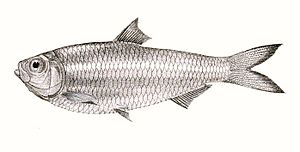Escualosa thoracata facts for kids
Quick facts for kids Escualosa thoracata |
|
|---|---|
 |
|
| illustration | |
| Scientific classification | |
| Synonyms | |
|
The white sardine (Escualosa thoracata) is a small, shiny fish. It belongs to the Clupeidae family. This family includes many well-known fish like herrings and sardines. A scientist named Achille Valenciennes first described it in 1847. People sometimes call it the deep herring or northern herring.
Contents
All About the White Sardine
Where Do White Sardines Live?
White sardines are tropical fish. This means they live in warm waters. You can find them near the Earth's equator. Their home is the Indo-Pacific region. This area stretches from Thailand to Indonesia and Australia. They usually swim at depths of up to 50 metres (about 164 feet).
What Makes Them Special?
White sardines are known for being amphidromous. This means they can move between fresh and salt water. They do this at different times in their lives. However, these movements are not for breeding. The largest white sardine ever found was about 10 centimetres (4 inches) long. This measurement is called its standard length.
You can tell the white sardine apart from its close relative. Its sister species is the slender white sardine (Escualosa elongata). The white sardine has a deeper body. It also has a wider silver stripe along its side.
What Do White Sardines Eat?
White sardines are not picky eaters. They feed on tiny living things in the water. These tiny organisms are called zooplankton and phytoplankton. Zooplankton are tiny animals. Phytoplankton are like tiny plants. They are both very important parts of the ocean's food web.
Why Are White Sardines Important?
White sardines are important to people. They are a commercially important fish. This means people catch them for food. They are sold fresh in markets. They are also often dried. This helps to preserve them for a longer time.

